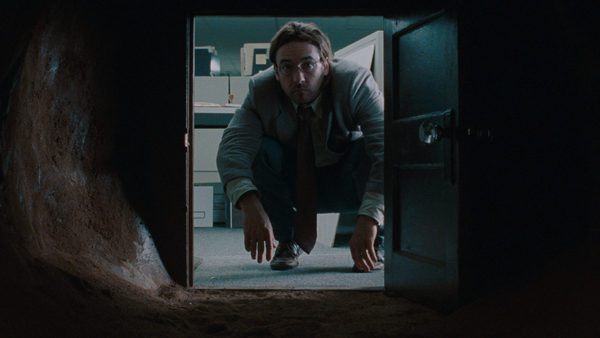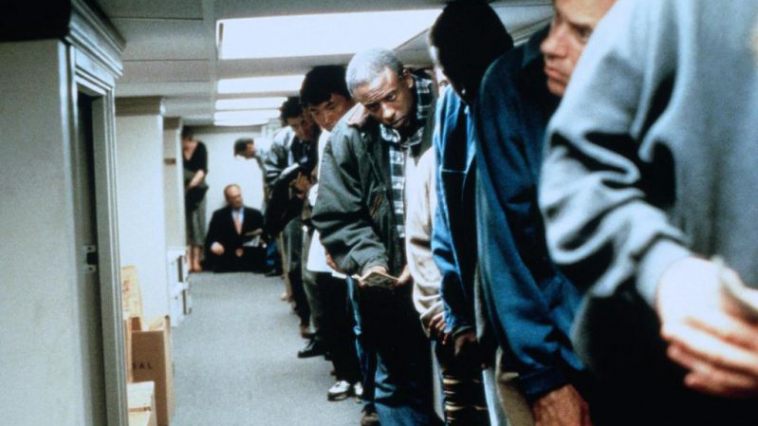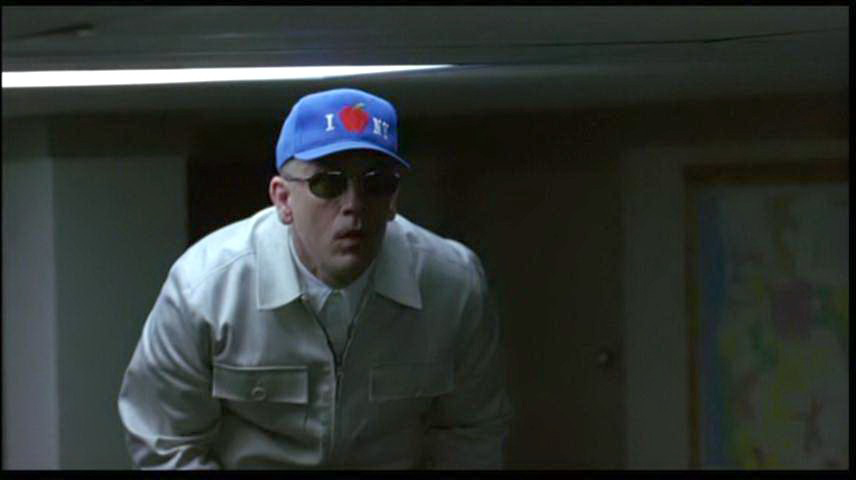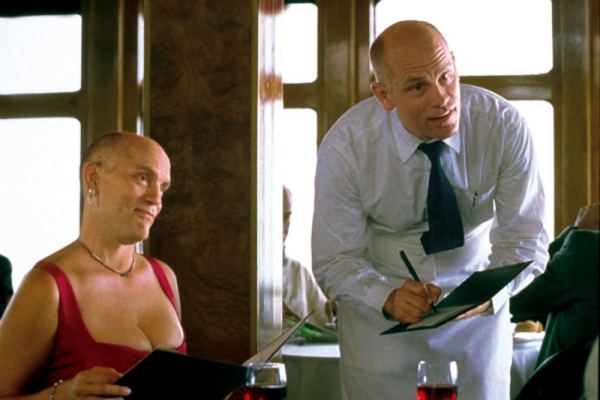
Released in 1999, Being John Malkovich was the debut feature film for both its director Spike Jones and scriptwriter Charlie Kaufman. Craig Swartz (John Cusack) is an out of work puppeteer who takes a job at an office, eventually discovering a portal which leads into the mind of actor John Malkovich (the actor performing as a parody of himself).
Here one can remain for fifteen minutes until ejected as if falling from the sky at the roadside just outside the city. Strange as the premise may have sounded the film went on to be a success at the box office, receiving an Academy Award nomination for Best Screenplay. Unusual, memorable, original and cult are all words which could be used to describe the finished film.
The success of Being John Malkovich indicates that there is an audience and recognition out there for a writer who has an unusual idea for a screen play, here is a list of 10 lessons just such a writer, indeed any writer, may take from the film:
1. Magical Realism

Put simply magical realism is the term given to the portrayal of what one would term as magical incidents or the use of magic as an everyday occurrence in an otherwise everyday environment. Being John Malkovich uses this concept to allow the film’s plot and potential themes to go far further than the viewer may initially expect.
Craig discovers the portal to Malkovich’s mind and soon enough it becomes a curious but accepted money making venture. The portal is considered unusual but the characters in the film, an otherwise normal contemporary word, accept it and, like the story, move onward.
This is only just the start of the film, there are far more twists and turns to come, as Roger Ebert observed, ‘the film goes somewhere else completely in the second half’. In short, harnessing the concept of magical realism allows for an otherwise ‘out there’ story to move on far quicker and far further than it would do given a more conventional approach.
Imagine if the film had been made in the 1980’s by Stephen Spielberg – the portal would be discovered by a group of teens, explored with caution and kept secret, until in the final act the ‘secret authorities’ would close in and want to use it to XYZ – all this would help maintain the pretence of reality and aid the suspension of disbelief.
Not to put down Spielberg, maybe the approach above would have been equally or more successful in 1999, maybe it would have been too run of the mill, but it does highlight a different approach. Using magical realism as a ‘writers tool’ allows for stories to be given a fresher perspective, normalising the extremely unusual to make the audience question reality in even greater detail – making one idea/script go further.
2. Latch on to Human Nature

One might question why audiences wouldn’t find the concept of a portal into someone else’s mind and then the fact that queues would quickly form lining the corridors of floor 7 ½ with punters eager to visit it for fifteen minutes a little difficult to accept.
However, there is perhaps nothing as equally strange yet predictable as human nature – the curious desire to see/witness something from another’s perspective and/or something ‘forbidden’, is the grass greener on the other side or from someone else’s perspective.
The fact that Craig can turn this into a lucrative business feels like a natural move forward for the story, partially for the magical realism approach as considered above, but also due to the fact that Kaufman’s script taps into human nature. In many ways once the initial concept or event is established all the script /writer has to do is let events and character interaction play out as human nature may dictate.
Fantastical as the film’s premise may seem, all the characters in Being John Malkovich act in credible ‘human’ ways with wants, needs, hopes and fears, as well as their own idiosyncrasies.
3. Project Forward

A film is/has been a success, it is tempting for the writer to strive to repeat its formula. However, this doesn’t always pay off, what once seemed shocking or ‘new’ often falls flat as trends move on.
Audiences and society move on (or just elsewhere) in their points of reference or concerns. Rather than replicating the success of other scripts, it is useful for the writer to be perceptive, try to ‘project’ the concerns of today forward slightly, amplifying or ‘adjusting’ them into something that will strike a chord with audiences.
Granted, no one can see so clearly into the future but with Being John Malkovich Kaufman would appear to have been looking to the approaching horizon – a celebrity obsessed culture, the rise of the internet and social media, to some extent audiences can now access another’s instagram or twitter account etc and ‘view the world through another’s eyes’.
In many ways the concept of Being John Malkovich has become more poignant since its release or, as with the above point , maybe the film tapped into some constant fixtures of human nature. It is all very well being in tune with the zeitgeist but it is perhaps more useful for the writer to consider what is coming next and what appears to remain the same.
4. Fuzzy Logic

Allowing magical realism and human nature to do some of the writer’s leg work in suspending audience disbelief is all very well but sooner or later the issue of credibility will raise its head. An audience will only take so many out of the ordinary/unusual events before plot progression runs the risk of turning into a series random events and generating any genuine sense of jeopardy or raising the stakes will become tricky.
The danger here is that the audience lose patience and with it interest. There needs to be some sort of explanation, regarding how or what is going on – some sort of ‘rules’ or ‘boundaries’, a ‘fuzzy logic’ no matter how sketchy needs establishing.
Kaufman’s script provides both the ‘boundaries’ and also raises the stakes in one swift move. Dr Lester’s (Orson Bean) explanation, and with it some suitably visual illustrations in an old book, to Lotte (Cameron Diaz) regarding the ripening of a host’s mind and the narrow window of opportunity to inhabit it provides the narrative with just enough explanation to aid credibility and up the stakes.
From this moment on there are potentially more serious consequences to joy riding in Malkovich’s mind, crucially a time limit has also been placed on proceedings, providing a sense of urgency to the remainder of the narrative.
Granted, Dr Lester’s explanation is far from comprehensive but it is suitably fleeting –a long winded and detailed expositional piece at the point would have stifled the pace just as much as it may have done earlier in the film (see this site’s Pulp Fiction Scriptwriting List regarding ‘Don’t Over-Explain Everything’.
Crucially the logic, the rules, are in place, without them the final act just would not hold interest. Audiences need just enough ‘fuzzy logic’ to make the plot work – the writer needs to think in terms of charcoal sketches and not large handwritten tomes.
5. Have Fun

Why do people watch films – to be entertained – this does not mean there has to be a full comedy skit and dance routine every fifteen minutes, nor should it be taken as implying every film should be a sombre intellectual piece.
Fun as a cinematic experience is open to interpretation, but the point here is that the writer should take time to explore the fuller ‘experiential potential’ of their script, having ‘fun’ with their own creation/ideas. Chances are if the writer is having fun, so will the audience.
Consider the sequence where Malkovich goes inside his own mind, only to be confronted by a restaurant full of Malkovichs; a menu steadily lowers and inevitably reveals that even the buxom women in the red dress which one of the Malkovich’s is having dinner with also has a Malkovich head. The situation escalates as it seems the only word anyone can utter is ‘Malkovich’.
Here this scene, surreal as it appears and traumatic as it is for the character, has comedy timing and is played for laughs, it gives the audience some comedic relief from proceedings; a break from what has been the regular pattern of the narrative. Pure speculation but the scene must also have been ‘fun’ to write.